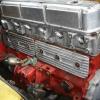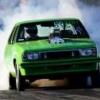Bottom End Knock
#1
 _Viper_
_Viper_
Posted 30 January 2011 - 12:27 PM
Ok so a bottom end knock I understand is from worn or damaged bearings... And im pretty sure I understand it but its just how I figure it in my head never actually had anyone properly explain it. But what is actually happening
On a old motor I can see how just over time the bearing wear away and create excessive clearance and Im guessing the knock is just the rod hitting the crank every rotation taking up the extra clearance?
Do you get a knock from Main bearings as well or only big ends? does it sound different?
Also how can you develop a knock suddenly? Lack of oil pressure for a second im guessing would be one cause? but what actually happens, does it just become metal on metal contact and wear them away extremely quickly and then its the same as above?
How about if ya run say N2O or too much boost, can this just hammer away at bearings and "squash" or maybe a better word is crush them? and then becomes the same as above? same sound?
Last but not least what causes a spun bearing? and do they create a knock also or do they generally seize the motor?
THANKS
#2

Posted 30 January 2011 - 01:55 PM
#3
 _daveHQ_
_daveHQ_
Posted 31 January 2011 - 07:34 PM
#4

Posted 31 January 2011 - 07:46 PM
Another thing that sounds like main bearings is oil soaked rear gearbox mount....I was convinced it was mains...and found it as I started disconnecting stuff under the car to pull the engine out....thats about the point in my apprenticeship I realised I should be 100% certain of what was actually wrong before I started pulling stuff apart.
#5

Posted 01 February 2011 - 11:11 AM
.....How about if ya run say N2O or too much boost, can this just hammer away at bearings and "squash" or maybe a better word is crush them? and then becomes the same as above? same sound?
Last but not least what causes a spun bearing? and do they create a knock also or do they generally seize the motor?
THANKS
With the boosted engines, they are prone to detonation and when the crank is forcing the piston up the bore and detonation is forcing it back down (this is happening before the piston reaches TDC) the bearing basically gets hammered and hangs out the side of the rod and gets wiped away. Then it starts knocking etc. If you change the oil and see bits of flaky bearing material then this is where its come from.
A spun bearing is where a bearing picks up on the crank and gets rotated in its bore (rod big end or mains tunnel). This is caused by insufficient bearing clearance or insufficient oil. When this happens a lot of heat is generated by the friction and it can end in rod or crank failure which in turn seizes the motor.
In my last motor I uncovered the oil pump pickup a few times with some wild driving techniques. The first couple of times it would have done some damage but the last time it overheated the rod which broke around the big end and was forced by the crank out through the side of the block. This all happened in less than a second at about 7000 rpm (I never saw the oil light come on until after the engine stopped).
Hope this answers your question !
Edited by Struggler, 01 February 2011 - 11:12 AM.
1 user(s) are reading this topic
0 members, 1 guests, 0 anonymous users














